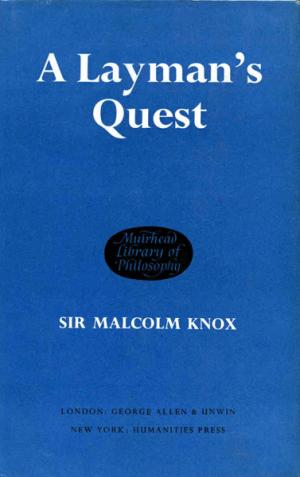Sir Malcolm Knox delivered his Gifford Lectures in 1966–1968 at the University of Aberdeen. The series was published in two separate volumes under the titles Action and A Layman’s Quest. Knox takes up Lord Gifford’s requirements in the first series of lectures (Action, published in 1968) through a treatment of action (as the core element in ethics) and its connection with religious belief. Establishing the reasonableness of religious belief from an examination of ethical concerns allows Knox (in A Layman’s Quest, 1969) to address the question as to which (Christian) religious beliefs can reasonably be accepted in light of historical problems raised by a tradition of great thinkers (in the West) and facing the Christian religion. His ultimate concern is with the paradox of immanence and transcendence that pervades and is unique to Christianity, and with its sensible characterisation. Knox is heavily influenced by the works of G. W. F. Hegel.
Action and Belief
Books
Action

Action examines action as the core element in ethics in its relation to religious belief. The investigation prepares the way for addressing which (Christian) religious beliefs can reasonably be accepted in light of a broadly historical philosophical investigation. This latter course makes up the content of the second series of lectures, A Layman’s Quest.
A Layman's Quest

A Layman’s Quest asks which (Christian) religious beliefs can be reasonably adopted in light of certain ethical considerations on action (outlined in Knox’s first series of lectures (Action) and in light of an upbringing in the Western world. Knox begins by outlining why he thinks it is reasonable to have religious belief, and concludes by examining the philosophical implications of such belief in light of the historical survey he sketches between the first and final chapters.
- Jon Cameron, University of Aberdeen


